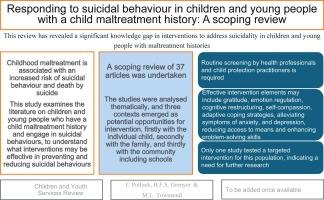Responding to suicidal behaviour in children and young people with a child maltreatment history: A scoping review
IF 2.4
2区 社会学
Q1 FAMILY STUDIES
引用次数: 0
Abstract
Child maltreatment affects millions of children internationally every year. Development is negatively impacted by maltreatment increasing the likelihood of maladaptive behaviours. Associations between child maltreatment and suicidal behaviour and suicide in young people has been established. However, there is a research gap in understanding effective ways to respond to and intervene with suicidal behaviour in young people who have experienced child maltreatment. A scoping review was conducted in accordance with the Joanna Briggs Institute methodology to investigate interventions that may be effective in preventing and reducing suicidal behaviours in young people who have experienced child maltreatment. Inclusion criteria were studies: (a) of children and young people who engage in suicidal behaviour and have experienced child maltreatment; (b) published in English during the time period 2000–2020; and (c) focused on responses and interventions to prevent or address suicidal behaviour. Across 37 studies, several intervention targets were identified through reflexive thematic analysis including cultivation of self-compassion, gratitude and future orientation, alleviation of depression, anxiety and post-traumatic stress disorder (PTSD) symptoms and psychological distress and addressing cognitive errors and negative views of the self. Screening and clear assessment of suicidal risk by health professionals and child welfare professionals was endorsed across studies. Several evidence-based treatments were proposed to support intervening with this client group, although only Emotional Intelligence Therapy (EIT) was empirically tested with this population. Utilisation of safe systems that the child or young person is in may be beneficial in addressing and reducing suicidal behaviour, such as inclusion of families, peers and the implementation of school-based interventions strategies. Future research is needed to empirically test and assess the effectiveness of interventions.

应对有虐待儿童史的儿童和青少年的自杀行为:范围界定审查
全球每年有数百万儿童受到虐待。虐待会对儿童的成长产生负面影响,增加儿童出现适应不良行为的可能性。虐待儿童与青少年自杀行为和自杀之间的关系已经得到证实。然而,在了解应对和干预遭受儿童虐待的青少年自杀行为的有效方法方面还存在研究空白。根据乔安娜-布里格斯研究所(Joanna Briggs Institute)的研究方法,我们进行了一项范围界定综述,以调查可有效预防和减少曾遭受儿童虐待的青少年自杀行为的干预措施。纳入标准为以下研究:(a) 涉及有自杀行为并曾遭受儿童虐待的儿童和青少年;(b) 2000-2020 年间以英语发表;(c) 重点关注预防或解决自杀行为的对策和干预措施。在 37 项研究中,通过反思性主题分析确定了若干干预目标,包括培养自我同情、感恩和未来导向,减轻抑郁、焦虑和创伤后应激障碍(PTSD)症状和心理困扰,以及解决认知错误和对自我的负面看法。各项研究都赞同由医疗专业人员和儿童福利专业人员对自杀风险进行筛查和明确评估。尽管只有情商疗法(EIT)在这一人群中进行了实证测试,但还是提出了几种循证疗法来支持对这一客户群体进行干预。利用儿童或青少年所处的安全系统可能有利于解决和减少自杀行为,如纳入家庭、同伴和实施基于学校的干预策略。未来的研究需要对干预措施的有效性进行实证测试和评估。
本文章由计算机程序翻译,如有差异,请以英文原文为准。
求助全文
约1分钟内获得全文
求助全文
来源期刊

Children and Youth Services Review
Multiple-
CiteScore
6.30
自引率
6.10%
发文量
303
期刊介绍:
Children and Youth Services Review is an interdisciplinary forum for critical scholarship regarding service programs for children and youth. The journal will publish full-length articles, current research and policy notes, and book reviews.
 求助内容:
求助内容: 应助结果提醒方式:
应助结果提醒方式:


